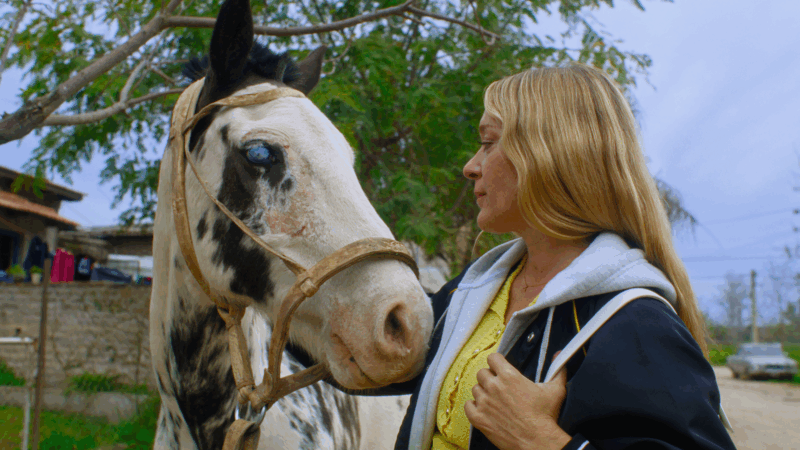Amalia Ulman mocks trend chasers in her new film, ‘Magic Farm’
In Amalia Ulman’s second feature, a New York-based documentary crew uncovers “crazy subcultures” in Latin America for their VICE News-like TV show, think Bolivian teen exorcists. But they get it all wrong, right from the start, in a comedy of errors that plays out as a droll tale of culture shock and appropriation.
The Argentine-Spanish conceptual artist directs and also stars in Magic Farm, which follows Chloë Sevigny as a TV anchor perennially displeased with her ragtag crew that also includes Alex Wolff and Joe Apollonio.
A screwup on the part of the presumptuously clueless Americans lands them in the wrong town in the wrong country without a subject to shoot. They were searching for a bunny-eared singer (one “Super Carlitos”) said to be living in San Cristóbal, but there are many towns of the same name throughout Latin America, and Super Carlitos is nowhere to be found where they went.
While the narrative can meander at times, Ulman makes up for it with an idiosyncratic and unconventional visual style filled with vibrant, saturated images, heavy use of fisheye lenses and shots taken from cameras attached to dogs. The whole thing is backed by an eclectic, sunny soundtrack.
Behind the smoke and mirrors of the surface story lies a grave one that the crew completely misses: pesticides are being dumped on the agricultural zone, triggering a health crisis that has spread throughout the town, leaving a trail of cancer and birth defects.
One of the locals in the story has a premature aging syndrome (Mateo Vaquer Ruiz de los Llanos, who died earlier this year) and another has a large port-colored birthmark on her face (Camila del Campo) — the actors’ own conditions in real life as well. Even after they are themselves sprayed with glyphosate during an aerial fumigation campaign, the crew still doesn’t get it and can think of nothing more than to stage a fake viral trend.
NPR’s A Martínez spoke with Ulman about her vision.
This interview has been lightly edited for length and clarity.
Interview highlights

A Martínez: Now, in the film, you play Elena, part of the documentary crew and the only one who speaks Spanish. There’s a scene early on in the film that I think for me kind of illustrates the crew’s presumptuous cluelessness, where they are reacting to street banners. What was going on and what were you trying to say with this scene?
Amalia Ulman: Well, there’s two sides to the story. One is them being as obnoxious as they are and the other is weird stuff that happens in Argentina like what we call pasacalles — they’re just banners. It’s pretty common for people to use them to communicate, it can go from congratulations on your graduation to having a baby, or people use it to confront their partners. So if someone’s cheating, they could hire somebody to hang these pasacalles in the middle of the street. It can be kind of intense. So I think it was for me to show both sides of the story of how ridiculous the Americans can be, but also how bizarre and weird Argentinians can also be and how they can meet in the middle.
Martínez: On the obnoxiousness of Americans. Why do you think that still persists? Is it just because Americans continue to be obnoxious or they’re just clueless and they don’t care?
Ulman: There’s such a hegemony still with how American culture permeates the world. A lot of other people in the rest of the world not only know about their own culture, but they are also very aware of American culture, right? American movies, music, etc. Whereas Americans have only been exposed to one culture which is their own. So I think when you go around the world, Americans force other people to meet them in their own culture and not the other way around. It probably comes from that idea of never having had to adjust to any sort of code switching or culture switch.
Martínez: This crew misses the obvious story right in front of them, that pesticides are really being dumped on this town and harming the people who live there. Do you think that this crew in the film was even equipped, intellectually and journalistically, to sniff out that kind of story?
Ulman: No, and the film doesn’t really put the blame on the crew themselves or the system they’re part of and the corporations they work for. Their job is to create those more superficial stories. And, as you said, they’re not really equipped to handle something like this. Especially in Latin America, to deal with that, you would have to deal with a lot of layers of corruption, pretty dangerous situations and stuff like that.
Martínez: Yeah, because staying longer to do a story on the environmental effects of the pesticides on these people would require a lot more money, a lot more time, and maybe maybe a different set of journalists altogether, and for their media company to be willing to do that.
Ulman: Exactly. Another thing that I’ve noticed and that I wanted to refer to in the film is that there’s a level of privilege in the idea that you’re allowed to complain and protest. And I think that’s a very American thing, which is good, by the way. But there’s a lot of countries that don’t have that, where the level of corruption is so high that to fight against a corporation might get you dead very quickly. There’s a lot of places where community resistance is not really even a thing. I kind of wanted to show that the people in the village, they’ve come to terms with the situation. It sucks, nobody likes it. But at the same time, they can’t do anything but to be kind to each other and try to move forward.

Martínez: So there’s this one scene where the character Justin, who’s the documentary crew’s sound guy, he’s played by Joe Apollonio. He clearly doesn’t understand cumbia music and he tries to get the musicians to change the music. It’s like he wants them to just adjust to his version of Latin music and not what it actually is.
Ulman: Yeah, but I mean, that’s something that I’ve seen all the time when I’ve experienced.
Martínez: No kidding, really?
Ulman: Yeah. I don’t think it’s that intentional. I think it just comes from ignorance and not having your ear attuned. This musician that I work with, she can make the soundtrack. But any other time that we were using other songs in the film and somebody that is not Argentinian or Latin American would suggest songs, I would always be like, ‘Oh my God, that’s a Cuban song, that doesn’t sound at all like something that would be there, or that’s Mexican.’ I have the background knowledge to see the difference. I’m not that judgmental about that because I think it just comes from the lack of exposure a lot of the time. But I do feel that sometimes Americans are way too proud about the lack of exposure.
Martínez: Right, but here’s the thing, if I were part of that documentary crew, I would have spent like a day trying to see and hear the different sights and sounds of the place that I thought I was going to before I showed up there so I could understand the difference and not embarrass myself in front of the two people who live there.
Ulman: Sometimes, just not speaking the language also is a big thing too. Because I’m white, I’ve experienced a lot of people that I know, especially in the fine arts, saying a lot of racist stuff against Latin Americans in front of me because they’ve forgotten that I am Latin American. Because Americans sometimes don’t speak other languages, they don’t understand how difficult it is to speak another language. And there’s a lot of Latin Americans in the U.S. who don’t speak English very well, where it’s assumed that they’re stupid just because their English isn’t perfect. And because I speak a few different languages, I am able to have a bit more empathy with that.
Martínez: It’s the same thing with my mom, too. My mom had to learn English when she came to the United States from Ecuador, and she’s brilliant. But in English, maybe she didn’t sound that way. So does it require more patience and grace from the people that are hearing this?
Ulman: I think a lot of people in the U.S. have barely traveled to other places. I’ve never met people more proud of not having a passport than I’ve met in the United States. And there’s a reason for that. America is very beautiful. A lot of people are not interested in the culture-traveling process, and I get that. I also would love to just feel that way. It’s this sort of feeling of superiority, but also lack of empathy when dealing with people who come from other places and have bad English.
The broadcast version of this story was produced by Carla Esteves. The digital version was edited by Majd Al-Waheidi.
U.S. unexpectedly adds 130,000 jobs in January after a weak 2025
U.S. employers added 130,000 jobs in January as the unemployment rate dipped to 4.3% from 4.4% in December. Annual revisions show that job growth last year was far weaker than initially reported.
Greetings from Mexico City’s iconic boulevard, where a dog on a bike steals the show
Every week, more than 100,000 people ride bikes, skates and rollerblades past some of the best-known parts of Mexico's capital. And sometimes their dogs join them too.
February may be short on days — but it boasts a long list of new books
The shortest month of the year is packed with highly anticipated new releases, including books from Michael Pollan, Tayari Jones and the late Nobel laureate Mario Vargas Llosa.
Shootings at school and home in British Columbia, Canada, leave 10 dead
A shooting at a school in British Columbia left seven people dead, while two more were found dead at a nearby home, authorities said. A woman who police believe to be the shooter also was killed.
Trump’s EPA plans to end a key climate pollution regulation
The Environmental Protection Agency is eliminating a Clean Air Act finding from 2009 that is the basis for much of the federal government's actions to rein in climate change.
Pam Bondi to face questions from House lawmakers about her helm of the DOJ
The attorney general's appearance before the House Judiciary Committee comes one year into her tenure, a period marked by a striking departure from traditions and norms at the Justice Department.







